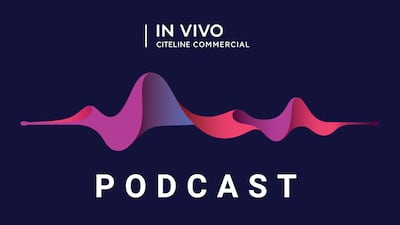Big Steps For Sigrid
Heading up Sigrid Therapeutics, developers of a range of silica-based products designed to combat high blood sugar and obesity, is Sana Alajmovic.
As well as leading Sigrid, Alajmovic also works with SwedenBio, Sweden's national life sciences trade organization, where she helps Swedish start-ups grow their business and find talent.
When discussing what it is like leading a company as a woman, Alajmovic revealed that she had made many personal sacrifices during her time as CEO. Most recently, during her maternity leave, Alajmovic continued working two and a half days a week, for just three months. “We’re expected to work as if we don’t have children, and raise children as if we don’t work,” she said.
Take a look at the full interview here.
Holograms And Emotions
Alison Sundset is the CEO of Holocare, a company that converts standard CT DICOM images into 3D holograms that can be displayed on VR headsets, allowing clinicians to more easily plan complex surgeries.
Prior to this, Sundset held roles at major companies like Philips and Pfizer in Europe – a geography one would expect to be ahead of the curve when it comes to gender inclusion.
However, this was not her experience. Sundset told Medtech Insight that, as a woman, she had to tone down her emotions and that, many times, she “felt overlooked – like I ticked a box.”
Training herself to be un-emotional has come at a cost.
“I’m mid-way through a series A – trying to raise a significant amount of money – and was running through my presentation with a lawyer who is helping on the due diligence side of things,” she said. “At the end of it, he just asked ‘What has happened to you? Where is all the emotion?’ Getting the balance right is hard and I do still sometimes find it intimidating to be a woman in meetings with big corporates and investors.”
Take a look at the full interview here.
Equality In Cardiology
Alexandra Lansky is a professor at Yale University’s School of Medicine and director of the school’s heart and vascular research program. She is also one of the principal investigators of the EMPOWER CAD trial, which is the first cardiology study of its kind to include only women.
Sponsored by Shockwave Medical, the study is enrolling 400 women across the US and Europe to determine whether positive results in both sexes from earlier studies with Shockwave’s C2 coronary IVL catheter can be replicated in a large cohort of female patients undergoing a percutaneous coronary intervention.
In this Q&A, Lansky discusses both the challenges women face in cardiology, but also the benefits of having more women in the field.
Borrowing Confidence
Sonja Fulmer, the deputy director of the FDA’s Digital Health Center of Excellence joined the US Food and Drug Administration almost 10 years ago.
While she had a lot of professional mentorships throughout her career, she’s found that being able to “borrow confidence” has been an incredibly important piece of her professional development.
“My mentors would have confidence in me, even when my own confidence was wavering, and that's incredibly powerful,” she said.
Now, she strives to do that for her younger employees. She’s now on the lending side of the mentor/mentee relationship, and she values the ability to be an example for other women in the early stages of her career.
“One of the biggest challenges for women in tech fields – or other fields where women are less well represented – is not always having an example at higher levels of leadership to aspire,” which applies to all types of diversity, she said.
Fulmer said she’s grateful to be surrounded at the FDA by other accomplished women working towards the same mission, supporting each other professionally.
Read the full interview here.
Having It All
If you want to work in government law, you should first work in government.
Anne Walsh, a US Food and Drug Administration lawyer at Hyman, Phelps & McNamara, in Washington DC, got her start at a large law firm. For her, choosing to move to a government position was a “step forward” toward the career she wanted.
“When I was coming out of law school, I wanted to be a corporate lawyer,” she said, “but that’s not always how it works out.”
Walsh began working on pharmaceutical litigation, and during that time she really enjoyed getting into the weeds of how the FDA regulates products.
Walsh served as an associate chief council for the FDA for seven years before joining her current employer, a small boutique firm in DC.
“I wanted to make sure I had credibility as an FDA lawyer, and you can't really do that if you've never been [at] FDA. I can only learn so much on paper or through work experience,” Walsh said.
Walsh worked with a lot of other female employees while she was at FDA, and she believes the stability of the job is why a lot of women are attracted to those positions in the US. It was also a generally friendly place for female professionals, she said.
Government work is more stable and allows employees a “much more manageable work-life balance,” which can be an advantage for women wanting to start a family.
Read the full story here.
Why Don’t Investors Appreciate The Value Of Women’s Health?
For Looi Chung, CEO of Ablatus, developers of a new tool that uses an enhanced form of ablation to treat fibroids, a condition that can lead to debilitating pain for women, this is a big question.
The company’s technology, which could provide a safe and effective alternative to the current “gold standard” of open surgery – many of which lead to partial or full hysterectomies – has raised just £3m so far.
Chung describes pitching her technology to a room full of men – often they have this look of ‘I can’t relate, so I won’t engage.’”
And although fibroids only impact women, Chung believes women's health should be a focus for everyone, regardless of gender.
“Women are, obviously, not here just to reproduce, but don’t forget, we are all here thanks to women’s health. Men may say they can’t relate to the womb, but they spent nine months there once... it’s really worth remembering that,” she said.
Take a look at the full story on March the 11th
Restructuring Success For Women
Jasmine Balloch is the chief of staff at health tech start-up Tortus. Tortus provides doctors with an AI-enabled note-taking tool to assist them with patient consultations.
When asked what International Women’s Day means to her, Balloch told Medtech Insight: “Women don’t have hundreds and hundreds of years of role models to look up to, but that’s what makes it exciting. We can repackage and restructure what success looks like.”
She went on to describe how she found success, through following her interests, thinking about her character and strength, but without tying herself to a set outcome.
Read the full story on the 12th of March
Her Health, Her Story
Marissa Fayer is the founder and CEO of HERhealthEQ, a global non-profit focused on women’s health equity.
In this interview, Fayer discusses her own journey as a female CEO and leader in medtech, and the benefits of having more women in the industry as well as some of the challenges that remain. She also touches on the role of government in advancing women’s health issues, particularly in funding more research into diseases that uniquely affect women.
Read the full story on the 14th of March
Redefining Challenges Into Sources Of Strength
Anne Osdoit juggles three major roles. First, she is the CEO of Moon Surgical, a company that has developed Maestro, an intelligent instrument-holding system that makes laparoscopic procedures easier for surgeons to perform.
She is also a partner at Sofinnova Partners, a leading Paris-based life sciences investment firm that, Osdoit notes, has a much-better-than-average male:female ratio.
“It really lifts a weight,” she said. “We really try to replicate this in our investments. When I receive a pitch deck, and I can’t see a woman on the team or board, I close it. In a way, it just shows that the company is not representative of half of its target population. It also shows that there’s a lack of balance – there's a high chance that if the company grows and develops, something will be amiss.”
Finally, Osdoit is a mother. Last year she published a book, titled “Danser Sous La Pluie” (Dancing In The Rain), discussing the past four years of her personal life, with a focus on health issues faced by her mother and daughter.
Its overall message, according to Osdoit, centers on redefining issues that could pose as challenges or limiters to success into sources of “strength and inspiration.”
Read the full story on the 15th of March
Accelerating The Pace Of Change
Ghada Farah is the Senior Vice President for Terumo Interventional Systems in the EMEA and a MedTech Europe board member.
When asked about her experience of the medtech industry as a woman, Farah told Medtech Insight: “We don’t have parity yet, but it is our responsibility (men and women) to accelerate the pace of change.”
Read the full story on the 19th of March
Lean On People Who Believe In You
Sophie Dutilloy is the President of International Vision Care at Alcon and a MedTech Europe board member.
She is responsible for the commercialization of Alcon’s Contact Lens, Contact Lens Care and Artificial Tears portfolio outside of North America.
When asked about her experience of the medtech industry as a woman, Dutilly told Medtech Insight: “It is too easy to dismiss the fact that women still face barriers to their progression and development at work because of personal and family obligations. It is important to proactively identify and solve these situations.”
Bringing MedEx Women Together To Strategize, Network
Maria Shepherd held multiple leading marketing positions in the medtech industry before starting her own consulting firm Medi-Vantage in 2007 to help medtechs of all sizes with strategic question such as ‘What is the best time to be acquired’ and “What is your product development strategy?’
Then in 2019, Shepherd and Laurie Halloran co-founded MedExec Women, which brings together women executives in medtech once a year on the East Coast into a safe space to share experiences, strategies and to network. The next event will be held in April and is expected to draw more than 200 women execs.
Read the full story on March the 18th.
Persistence Pays Off
Daniela Delledonne is the Vice-President & General Manager BD Biosciences and elected IVD Board Member of MedTech Europe.
Before joining BD, Daniela worked for Hill-Rom, Medtronic, Sorin Biomedical Cardio and Covidien. When asked what advice she would offer women in the medtech industry, Delledonne told Medtech Insight: “Your journey is unique, and persistence pays off. As women in MedTech, we have the power to drive innovation, improve patient outcomes, and shape the future of healthcare.”
Read the full story on the 20th of March
Beth Sebern McCombs’ Advice To Aspiring Women Medtech Leaders: Be Curious, Grow and Drive Results
After spending more than 20 years at various roles at Johnson & Johnson, Beth Sebern McCombs joined Becton, Dickinson & Co in 2019.
An MIT graduate, McCombs knew early on she wanted to pursue a career in medtech and believes that AI and generative AI are going to open up opportunities we can’t even imagine yet. She said these new technologies will make R&D more productive, such as product regulatory submissions and documentations, which will free up employees to spend more time with customers.
McCombs considers herself fortunate to have had a lot of support and mentors throughout her career and a husband who has taken the role as parent after the birth of their first child. That said, she noted, it’s tough for many women leaders to find that work-home balance. She feels that some women still face biases at the workplace such as their work being underestimated or assumptions that women can’t travel as much as men due to home responsibilities. As a member of the BD Executive Leadership Team, McCombs works hard to advance a culture of inclusion, diversity and equity.
Story to be published 20 March
Meno-Pausing The Imbalance
The global menopause market hit $15.4bn in 2021 and is expected to reach $24.4bn by 2023, according to data from Grand View Research.
Surveys have shown that many women often fail to recognize that they have perimenopausal symptoms and don’t seek treatment. Yet, perimenopausal and menopausal symptoms can have lasting health implications that can have a significant impact on their aging process.
This article will highlight companies working on digital solutions in menopause and talk about how the first ever White House Initiative on Women’s Health Research, led by First Lady Jill Biden and the White House Gender Policy Council, will move research in the menopausal space forward.
Story will be published during Women's History Month (March)







